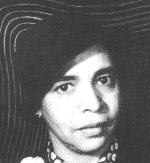
Negotiating Differences: Personal Identity and Othering in Nella Larsen
Invited
Presentation: ACT 11, Lisbon March 2004
This particular
paper is an attempt to see the fate of one writer as the result of a
specific
historical and cultural situatedness. Nella Larsen’s own biography and
her
literary works can both be read as cultural texts, situating themselves
in a
particular socio-cultural context: The Harlem Renaissance. The themes
she
discusses in her literary works are specific to a racial and gendered
discourse, and her own fate is readable as a text which is also marked
by the
dynamics of racial and gendered belonging and (fear of) exclusion.
Complicating
this dynamics of race and gender negotiations are economic and class
related
pressures on Larsen to achieve a means of living as a professional
writer,
pressures which ultimately led to her being silenced as an artist.

The paper gives,
first, a biographical sketch of Larsen’s mixed, and to some extent
obscure,
origin and background. Here the focus is on the issues of race and
ethnicity,
and to some extent on class and economic issues. Second, the social
construct
of The Harlem Renaissance is presented as a force to be reckoned with
in the
USA of the 1920s. The third, longer, introductory segment, which is of
a more theoretical
and methodological nature, presents the notion of difference discourses
as a
tool for understanding and analysing texts in the widest sense of the
word. The
paper then moves on to looking more closely at Nella Larsen’s literary
works in
order to illustrate how these three frames add new layers of
understanding to
our readings of her fictional texts, as well as the text of her life.
The
readings focus in particular on her first novel, Quicksand
(and especially on those portions of it that are set in
Denmark), but also briefly discuss her second novel, Passing,
and the concept of negotiating racial belonging that is
known as “passing (for white)”. Finally the presentation looks at how
Nella
Larsen lost her foothold in the socio-cultural group of her choice, and
how she
was effectively ostracised from this position of belonging or cultural
sanctuary.
